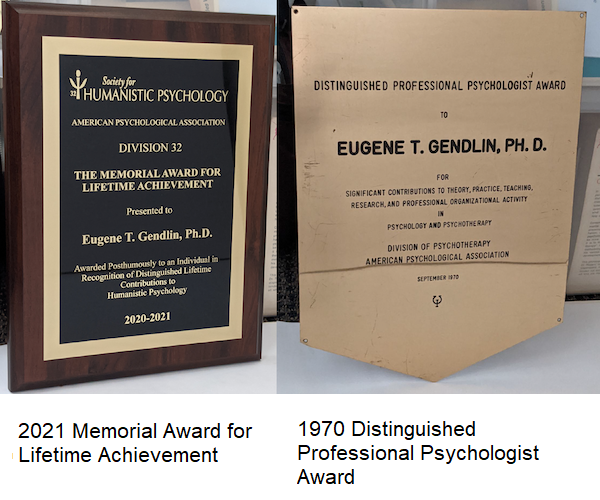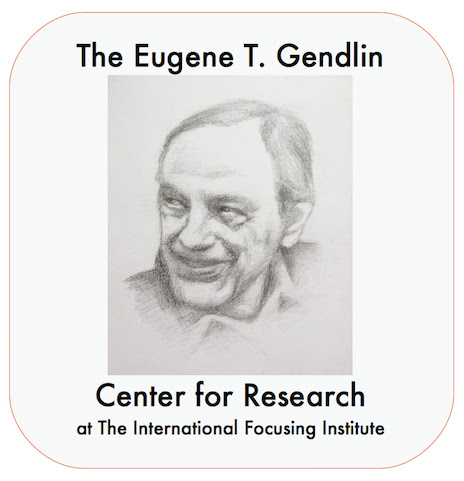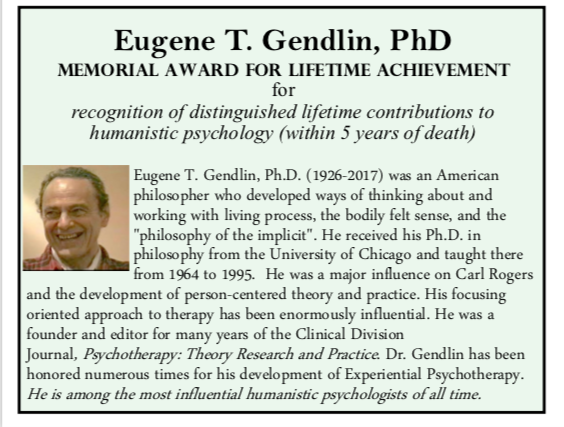Awards for Eugene Gendlin’s work on Focusing.
On Sunday, June 6, 2021, a Lifetime Achievement Award was presented at a special Awards Ceremony. hosted by the Society for Humanistic Psychology, a division of the American Psychology Association.
At the beginning of his career, in 1970, Gene was the first recipient of the “Distinguished Professional Award in Psychology and Psychotherapy” from the APA’s Division of Psychotherapy (Division 29). Receiving this award now puts a meaningful cap on the recognition Gene has received from the APA.

Focusing Research published
By making a regular daily practice of checking in with your bodily felt sense of the various life situations you encounter allowing this felt sense to guide your decisions, you are more likely to experience satisfaction with life and less likely to experience distress and existential anxiety. Such are the conclusions supported by a recent study that surveyed 385 Dutch-speaking participants about their experience with Focusing.
The study (Vanhooren, Grosemans & Breynaert, 2021) is the first publication among several being conducted by a research group focused on meaning and existence in the context of clinical and existential psychology. The group, led by Dr. Siebrecht Vanhooren (pictured), is based at KU Leuven, the top research university in Belgium.
“Making sense of our existence is one of the most demanding aspects of being human. Studies have shown that meaning is robustly associated with well-being and mental health.” Vanhooren was able to support his main hypotheses that to the degree that one adopts a Focusing attitude (defined as the practice of contacting one’s felt sense), one would experience greater life satisfaction and less distress and existential anxiety.
He speculated that Focusing might be a self-motivating process saying, “Once you are aware of the impact Focusing has on your life, it could stimulate you to do more of it.” He said this has implications for how Focusing training is conducted. “We are trying to find ways to help people focus more frequently, even in small ways, and also to become more aware of the impact it has in their daily lives.”
When asked what the overall mission of his research is, Vanhooren said, “We in the person-centered, Focusing-oriented and existential therapies have a big role to play now and in the future, especially around helping with the existential concerns of people.” This meaningful area, made more relevant as the entire world wrestles with the experience of a global pandemic, is one that these approaches have been shown to be most helpful with. “We can help people get to their core issues more quickly, and to help those suffering from death anxiety and a sense of meaninglessness.”
One of the biggest takeaways is that adopting a Focusing attitude in everyday life has many beneficial effects, in particular around the biggest questions – those of life and death, and existential meaning. Vanhooren suggests we might adopt a deliberate practice of checking in with ourselves as part of our daily routine and encourage our patients to do the same. This simple act may have far-reaching and profoundly helpful effects.
This research was made possible by your generous donations to the Gendlin Research Center. Please help us to continue to support this kind of valuable work.
Reference
Vanhooren, S., Grosemans, A., & Breynaert, J. (Accepted, May 2021). Focusing, felt sense, and meaning in life. Person-centered & Experiential Psychotherapies.
by Leslie Ellis.

